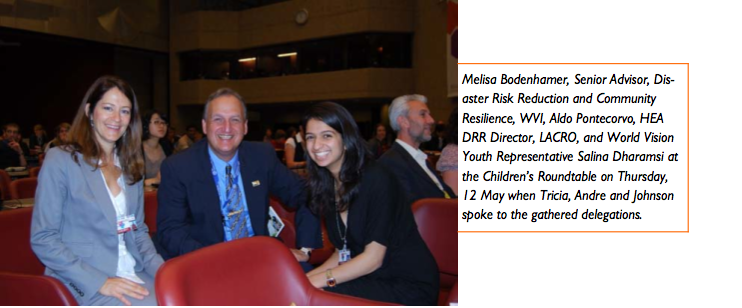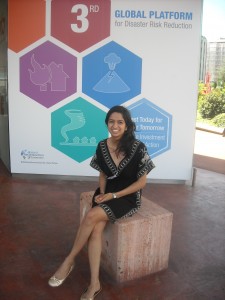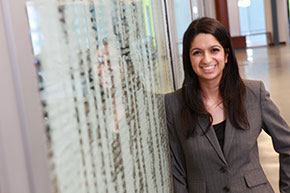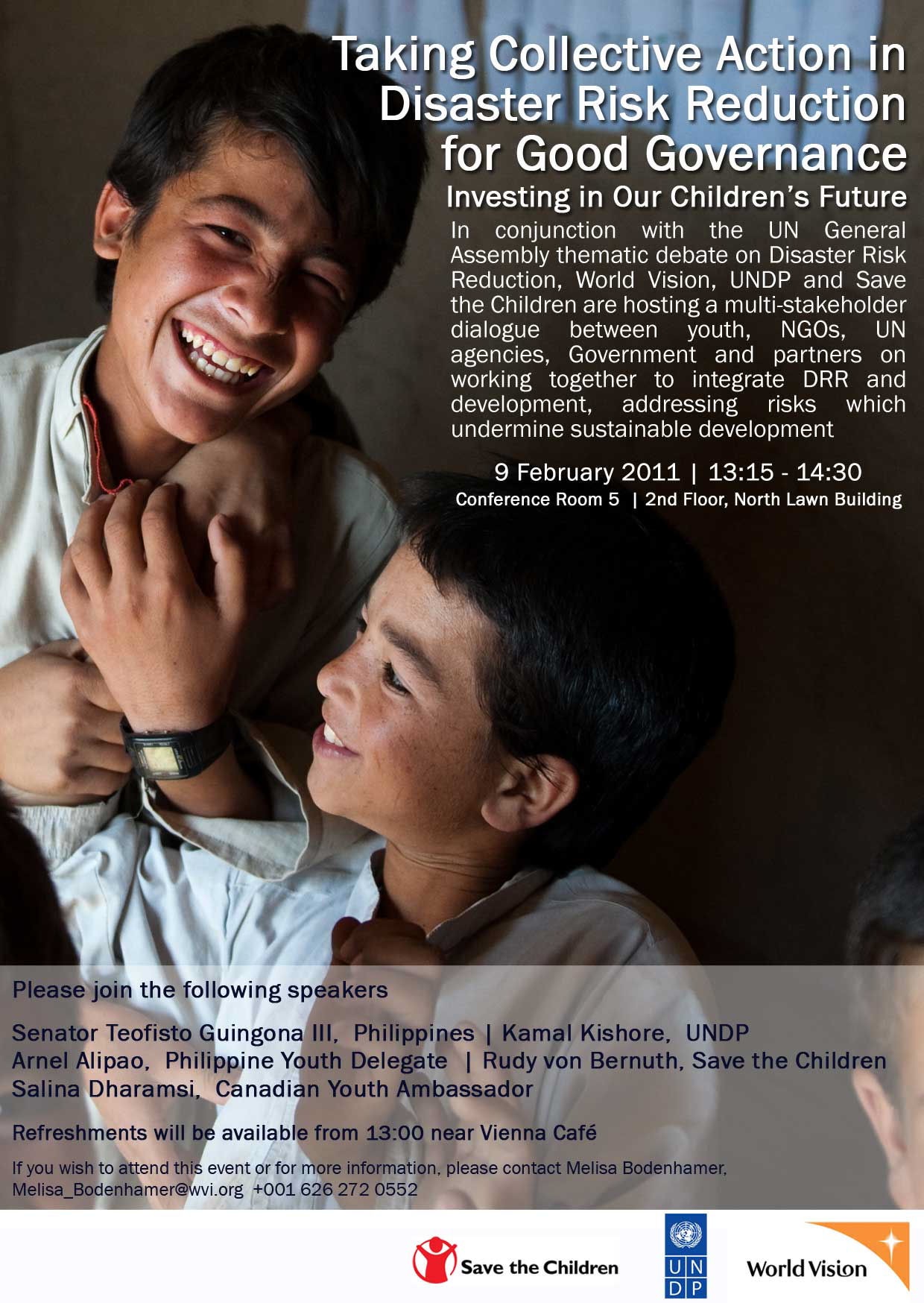Category Archives: USA & Europe
Posted in USA & Europe
Posted in USA & Europe
Salina at the United Nations (World Vision Connect).
Salina Dharamsi, a World Vision Youth Ambassador, recently participated in a couple important events with the United Nations. We caught up with her and asked her to reflect on her experiences.
1. Tell us about your recent activities with World Vision International.
In February of 2011 I was invited to participate in a multi-stakeholder debate at the United Nations in New York. The timely discussion, titled “Taking Collective Action in Disaster Risk Reduction for Good Governance – Investing in Our Children’s Future,” focused on disaster risk reduction and involved delegates from the UNDP, World Vision International, Save the Children and Unicef. As one of only two youth representatives at the talk, I advocated strongly for increased youth participation in disaster risk reduction activities and collaborated with leaders and believers in DRR to help develop tangible ways to increase youth participation in all areas of DRR related work.
In May of 2011, I was blessed with the opportunity to serve as a youth facilitator for the Global Platform for Disaster Risk Reduction in Geneva, Switzerland. Managed by the UN International Strategy for Disaster Reduction, the Third Session of the Global Platform brought together over 2,000 policy makers and practitioners from government, international organizations, NGOs, academia, and the private sector. Together we assessed and shared information and ultimately set new directions for disaster risk reduction work.
2. Tell us more about Disaster Risk Reduction as it relates to Climate Change.
Disasters (such as hurricanes, cyclones and flooding) are predicted to occur more often and with greater intensity due to climate change. It’s estimated that every year 175 million children will be affected by sudden climate-related disasters; without increased awareness and commitment from the global community lives of people just like us will tragically be lost.
3. What was your main message at the New York City event?
My main message at the New York City event was shaped by numerous conversations I had with young people before I left for the UN. The common thread between all the discussions I had was that the average Canadian youth feels left out of disaster risk reduction activities. During my address I emphasized three needs that, if addressed, will allow for greater youth participation in DRR related activities:
1. The need for age appropriate DRR information.
2. The need for greater emphasis on two-way communication channels where young people can engage with experts and experts in turn can engage with young people.
3. The need for leaders and believers in DRR to find specific, tangible, realistic and engaging niches in which youth can have substantial input and impact.
In essence, I focused on how the huge global issue of DRR needs to be broken down into tangible steps to engage the 6.5 million youth in Canada (and other young people globally) who are willing, eager and ready to get involved in DRR related decisions that will ultimately shape their futures.
4. Tell us about some of the youth you met in both New York and Geneva.
Through my participation in both of these events, I had the opportunity to meet several inspiring young leaders from disaster-afflicted areas of Kenya and the Philippines. Representing their communities, these young people shared how they have been directly involved in equipping their communities from drought and typhoons.
5. What did you learn through the experience?
The multi-stakeholder debate and Global Platform reinforced my passion for development and advocacy work and opened my eyes to the progress that can be obtained when passionate leaders from a variety of professional backgrounds come together.
6. How can Canadian youth be involved on this issue?
This is a really exciting time for young people to be involved in DRR related activities. With the recent development of the Children’s Charter for Disaster Risk Reduction and youth participation at high-profile events, the opportunities for youth to be powerful vessels of faith and hope, and protect nations in need are becoming more and more available. Don’t hesitate to research online or reach out to an organization you are familiar with for more information on how you too can be a part of DRR!
Posted in USA & Europe
Sauder student goes to UN to advocate for youth engagement in disaster risk reduction (Sauder Feature Story).
Third-year accounting student Salina Dharamsi recently travelled to the United Nations to participate in a multi-stakeholder debate focused on disaster risk reduction.
The timely discussion, titled “Taking Collective Action in Disaster Risk Reduction for Good Governance – Investing in Our Children’s Future,” took place just weeks before the catastrophic earthquake in Japan and focused on developing good governance and child-centred approaches to reduce suffering and mortality levels after natural disasters.
As one of only two youth representatives at the talks, Dharamsi joined delegates from the UNDP, World Vision International, Save the Children and Unicef to speak about how to get young people engaged. As an avid volunteer for World Vision and an advocate for humanitarian and development work, Dharamsi believes young Canadians have a lot to offer.
“I think Canadian youth are really passionate,” she said. “We were the first people to engage in fair trade coffee, and the first people on board fighting climate change and animal cruelty. We are connected through Facebook and Twitter. We have networks and we know how to get things done through them by engaging each other and really working together. If you can engage youth and make them passionate about something, you can really get the message out there.”
At the UN panel, Dharamsi spoke to an audience of over a hundred about three key ways that youth can be better engaged in disaster risk reduction. She stressed the importance of providing youth with jargon-free age-appropriate information about disaster risk reduction. She also suggested that young people need tangible measures to follow in order to raise awareness. Most importantly, she said young people need to be empowered to make change and share their ideas on how to make improvements.
“Disaster risk reduction information comes from one-way communication channels for the most part, and the reality is our generation is different, we crave dialogue,” she said. “We blog, we Tweet, we Facebook. We don’t just want experts to give us information. We want the opportunity to provide information back. We want to be part of this process and to share our assets. We don’t want to work in an environment that presumes the experts have all the answers and that we’re just here to mobilize them. We have answers, too.”
Dharamsi has been doing volunteer work since she was eight years old, but her enthusiasm for humanitarian work took off after the Southeast Asian tsunami hit in 2004. Since then, she has led the 30-Hour Famine at multiple high schools, spoken at various events, and volunteered in Vancouver’s economically challenged Downtown Eastside as well as Canuck Place.
She has also taught in the slums of Guatemala, and visited widows’ cooperatives, schools and nutrition clinics in Rwanda. Throughout these experiences, Dharamsi was constantly trying to find ways that youth can be involved in humanitarian work.
When she entered Sauder, Dharamsi also tried to find ways in which business students can use their unique knowledge and experience to make a difference in the developing world.
“It’s all about this global responsibility that will make us better business people,” she said. “The business of tomorrow is ethical business. It is business that is good for the planet—it’s triple bottom line: good for the planet, good for the people and it still makes a profit.”
Moreover, Dharamsi believes Sauder students have different expertise to offer than other UBC students.
“We’ve seen a lot of these issues being tackled by international development students, political science students and arts students, and that’s great, but business students should be playing a lead role in finding solutions to the world’s problems too,” she said. “Because we have different credentials, we’ve had different courses, and we’ve been exposed to economic development, we can offer a different set of assets to the issues.”
Dharamsi admits juggling a full course load with her volunteer work is no easy task, and it will only get harder this summer, when she starts interning at KPMG. Moreover, in several months’ time, she may be participating again in a similar international discussion. However, she believes that when you know your true passion, you will make time for it no matter what.
“We see that a lot at Sauder,” she said. “People who are really giving up their time and trying to build themselves into people who are not only at the school to learn business, but for a better purpose, and I think that’s really important.”
Online: http://www.sauder.ubc.ca/News/Features_Stories/Features_Stories_Item_-_Disaster_risk_reduction
Posted in USA & Europe
Posted in USA & Europe
Undergraduate student participates in UN panel to discuss disaster risk reduction (Sauder 360).
Third-year accounting student Salina Dharamsi participated in a UN panel on disaster risk reduction as a Canadian Youth Ambassador on February 9. The informal thematic debate was hosted in New York by the UN General Assembly in conjunction with World Vision, UNDP and Save the Children.
At the panel, Dharamsi joined representatives from these organizations to discuss how the UN and NGOs can improve preventative measures so that when disasters hit developing countries, the people will suffer less mortality, morbidity and infrastructure destruction.
As one of two youth representatives, Dharamsi advocated for ways through which the UN can engage youth in disaster risk reduction, such as the use of social media and the provision of jargon-free information and opportunities for youth to offer input.
Online: http://newsletters.sauder.ubc.ca/news/View.aspx?id=256747&p=0507
Posted in USA & Europe






Recent Comments